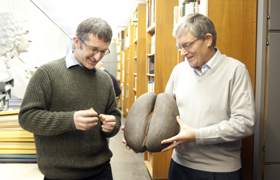World's largest seed comes to Reading
Release Date 16 February 2012

The University of Reading's Herbarium has been presented with one of the rarest seeds in the world to add to its huge collection of plant specimens.
The mature fruit of the Coco de Mer palm, which at 40-50cm in diameter and 15-30kg in weight, is the largest seed in the plant kingdom. It was donated to the University's Herbarium as a gift from ex-British Diplomat, Bob Jenner.
The large nut was deemed ‘the world's most erotic fruit' in the press last year, when the newly married Duke and Duchess of Cambridge were presented with their very own Coco de Mer nut by Seychelles President James Michel whilst honeymooning there.
Mr Jenner, who now lives in Overton, spent four years in the Seychelles working closely with the Islands' government. On leaving the Islands in 1992 the Seychelles Ministry of Foreign Affairs presented Bob with one of their very rare Coco de Mer seeds, as a token of the high esteem in which he was held.
The Seychelles is a living museum of natural history and a sanctuary for some of the rarest species of flora and fauna on earth. It is home to the only two remaining wild populations of the Coco de Mer plant (also known as the double coconut).
"It was during a visit to the Eden Project in Cornwall that I saw the University of Reading's involvement with the conservation of the Coco de Mer plant in the Seychelles," said Bob.
"It was then that my wife and I decided that attractive and unusual as it is, the nut does not serve any real purpose in our home apart from evoking distant memories, and so I wondered if it would be of any use to the University."
Dr Culham said: "We are delighted to add this extremely rare specimen to the 300,000 other examples of flowering plants, conifers, ferns, seeds and other flora in our Herbarium. It will be invaluable in engaging our students in the importance of conservation and plant diversity.
"The University of Reading has been involved in plant conservation in the Seychelles for many years now and it seems very fitting that this rare specimen has found its way from the Indian Ocean to the University."
The Herbarium, which was founded in 1900, is open requests for plant identification help from all over the world. Visits can be made by appointment - contact Dr Alistair Culham on a.culham@reading.ac.uk to find out more.
Photo shows Dr Alistair Culham (left) with Mr Bob Jenner and the Coco de Mer nut.
ENDS
For more information please contact Becki Rassell, University Communications Officer - +44 (0) 118 378 8408 / b.rassell@reading.ac.uk.
Notes to editors
The University of Reading is one of the top UK research-intensive universities, and is ranked in the top 1% of universities in the world (Times Higher Education World University Rankings 2011-12).
